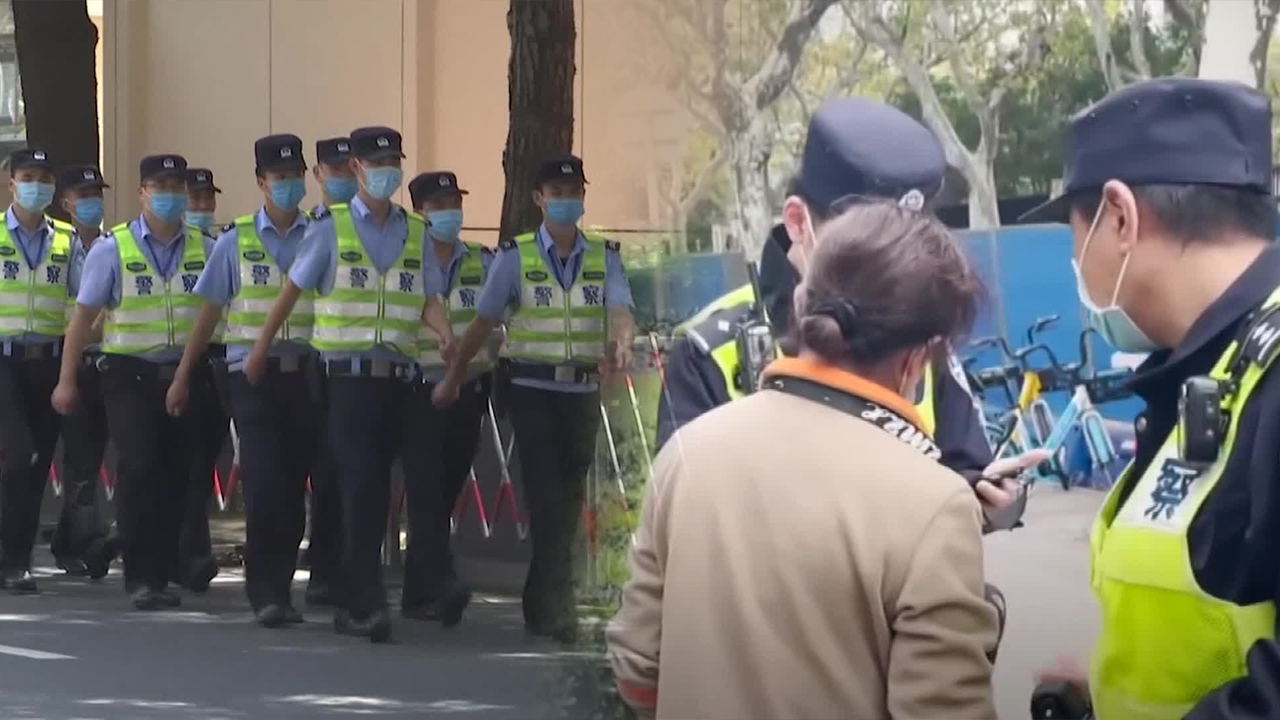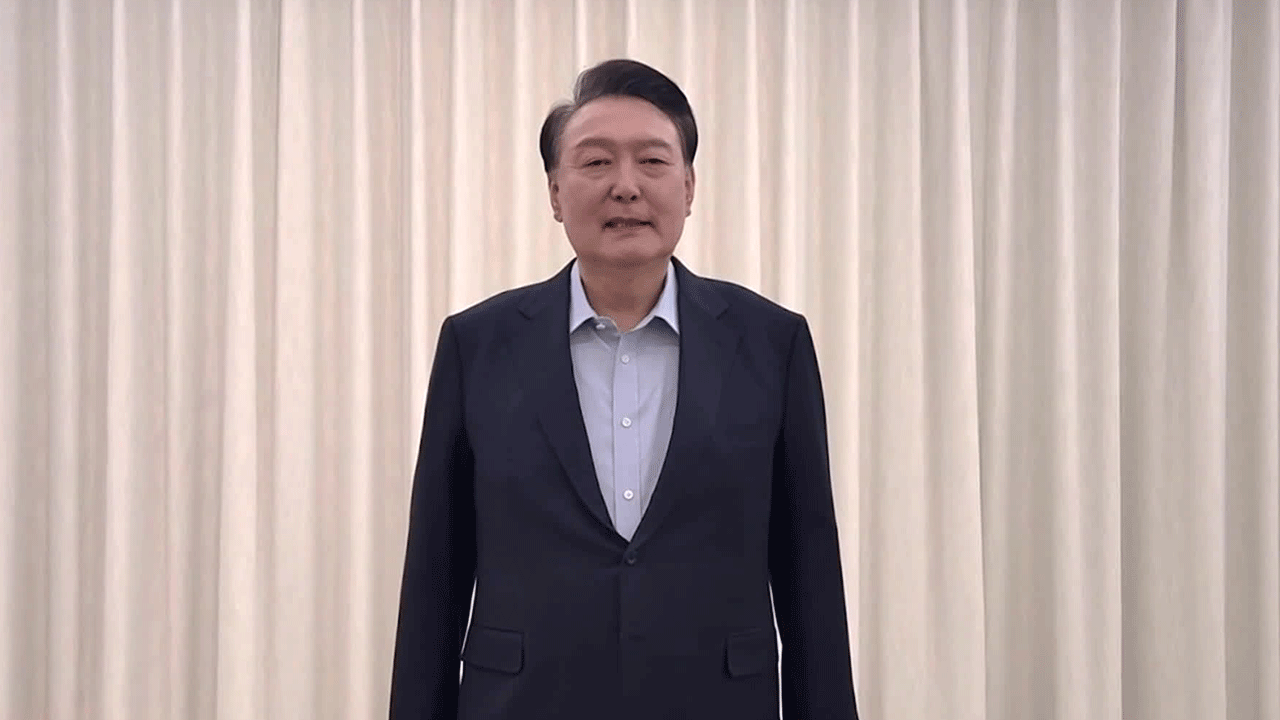China's revised Anti-Espionage Law sparks concerns over vague criteria and arbitrary application
입력 2024.10.29 (23:52)
수정 2024.10.30 (01:53)
읽어주기 기능은 크롬기반의
브라우저에서만 사용하실 수 있습니다.
[Anchor]
The recently revised anti-espionage law has been applied to our compatriot who was detained by the Chinese prosecution.
The law broadly defines acts of espionage as cases that threaten China's security and national interests, but there are concerns that the criteria are vague, allowing authorities to apply it arbitrarily.
Next, we have a report from Im Se-heum.
[Report]
On the street, Chinese public security officers are seen demanding citizens to open their mobile phones and delete content, leading to a confrontation.
Such scenes have become more frequent in China since the implementation of the revised anti-espionage law in July of last year.
This law has significantly broadened the definition and scope of espionage activities.
Previously, espionage was limited to leaking state secrets, but now even information that is not classified as state secrets can be considered espionage if it pertains to "national security and interests."
[China Central TV report/ July 2023: "The newly revised 'anti-espionage law' clearly establishes and improves the principles of national-level anti-espionage work coordination."]
The problem lies in the ambiguity of what constitutes "national security and interests," which gives the Chinese authorities ample room to arbitrarily determine whether an act is espionage.
For example, two years ago, a banner criticizing President Xi Jinping as a dictator was displayed in Beijing, and even foreigners who took photos and shared them could face punishment.
The Korean community in China has been worried that the revised anti-espionage law could be applied in a "what fits the ear is an earring, what fits the nose is a nose ring" manner, and this concern has intensified with the recent detention of Mr. A.
[Korean resident in China/voice altered: "I saw the news that someone was detained. I definitely felt that this anti-espionage law is being enforced. I thought I need to be more careful and pay more attention."]
The Korean Embassy in Beijing has also issued a notice stating that searching for or storing materials, photos, or statistics related to China's national security and interests on mobile phones and computers could constitute a violation of the law, urging caution.
This is KBS News, Im Se-heum.
The recently revised anti-espionage law has been applied to our compatriot who was detained by the Chinese prosecution.
The law broadly defines acts of espionage as cases that threaten China's security and national interests, but there are concerns that the criteria are vague, allowing authorities to apply it arbitrarily.
Next, we have a report from Im Se-heum.
[Report]
On the street, Chinese public security officers are seen demanding citizens to open their mobile phones and delete content, leading to a confrontation.
Such scenes have become more frequent in China since the implementation of the revised anti-espionage law in July of last year.
This law has significantly broadened the definition and scope of espionage activities.
Previously, espionage was limited to leaking state secrets, but now even information that is not classified as state secrets can be considered espionage if it pertains to "national security and interests."
[China Central TV report/ July 2023: "The newly revised 'anti-espionage law' clearly establishes and improves the principles of national-level anti-espionage work coordination."]
The problem lies in the ambiguity of what constitutes "national security and interests," which gives the Chinese authorities ample room to arbitrarily determine whether an act is espionage.
For example, two years ago, a banner criticizing President Xi Jinping as a dictator was displayed in Beijing, and even foreigners who took photos and shared them could face punishment.
The Korean community in China has been worried that the revised anti-espionage law could be applied in a "what fits the ear is an earring, what fits the nose is a nose ring" manner, and this concern has intensified with the recent detention of Mr. A.
[Korean resident in China/voice altered: "I saw the news that someone was detained. I definitely felt that this anti-espionage law is being enforced. I thought I need to be more careful and pay more attention."]
The Korean Embassy in Beijing has also issued a notice stating that searching for or storing materials, photos, or statistics related to China's national security and interests on mobile phones and computers could constitute a violation of the law, urging caution.
This is KBS News, Im Se-heum.
■ 제보하기
▷ 카카오톡 : 'KBS제보' 검색, 채널 추가
▷ 전화 : 02-781-1234, 4444
▷ 이메일 : kbs1234@kbs.co.kr
▷ 유튜브, 네이버, 카카오에서도 KBS뉴스를 구독해주세요!
- China's revised Anti-Espionage Law sparks concerns over vague criteria and arbitrary application
-
- 입력 2024-10-29 23:52:45
- 수정2024-10-30 01:53:46

[Anchor]
The recently revised anti-espionage law has been applied to our compatriot who was detained by the Chinese prosecution.
The law broadly defines acts of espionage as cases that threaten China's security and national interests, but there are concerns that the criteria are vague, allowing authorities to apply it arbitrarily.
Next, we have a report from Im Se-heum.
[Report]
On the street, Chinese public security officers are seen demanding citizens to open their mobile phones and delete content, leading to a confrontation.
Such scenes have become more frequent in China since the implementation of the revised anti-espionage law in July of last year.
This law has significantly broadened the definition and scope of espionage activities.
Previously, espionage was limited to leaking state secrets, but now even information that is not classified as state secrets can be considered espionage if it pertains to "national security and interests."
[China Central TV report/ July 2023: "The newly revised 'anti-espionage law' clearly establishes and improves the principles of national-level anti-espionage work coordination."]
The problem lies in the ambiguity of what constitutes "national security and interests," which gives the Chinese authorities ample room to arbitrarily determine whether an act is espionage.
For example, two years ago, a banner criticizing President Xi Jinping as a dictator was displayed in Beijing, and even foreigners who took photos and shared them could face punishment.
The Korean community in China has been worried that the revised anti-espionage law could be applied in a "what fits the ear is an earring, what fits the nose is a nose ring" manner, and this concern has intensified with the recent detention of Mr. A.
[Korean resident in China/voice altered: "I saw the news that someone was detained. I definitely felt that this anti-espionage law is being enforced. I thought I need to be more careful and pay more attention."]
The Korean Embassy in Beijing has also issued a notice stating that searching for or storing materials, photos, or statistics related to China's national security and interests on mobile phones and computers could constitute a violation of the law, urging caution.
This is KBS News, Im Se-heum.
The recently revised anti-espionage law has been applied to our compatriot who was detained by the Chinese prosecution.
The law broadly defines acts of espionage as cases that threaten China's security and national interests, but there are concerns that the criteria are vague, allowing authorities to apply it arbitrarily.
Next, we have a report from Im Se-heum.
[Report]
On the street, Chinese public security officers are seen demanding citizens to open their mobile phones and delete content, leading to a confrontation.
Such scenes have become more frequent in China since the implementation of the revised anti-espionage law in July of last year.
This law has significantly broadened the definition and scope of espionage activities.
Previously, espionage was limited to leaking state secrets, but now even information that is not classified as state secrets can be considered espionage if it pertains to "national security and interests."
[China Central TV report/ July 2023: "The newly revised 'anti-espionage law' clearly establishes and improves the principles of national-level anti-espionage work coordination."]
The problem lies in the ambiguity of what constitutes "national security and interests," which gives the Chinese authorities ample room to arbitrarily determine whether an act is espionage.
For example, two years ago, a banner criticizing President Xi Jinping as a dictator was displayed in Beijing, and even foreigners who took photos and shared them could face punishment.
The Korean community in China has been worried that the revised anti-espionage law could be applied in a "what fits the ear is an earring, what fits the nose is a nose ring" manner, and this concern has intensified with the recent detention of Mr. A.
[Korean resident in China/voice altered: "I saw the news that someone was detained. I definitely felt that this anti-espionage law is being enforced. I thought I need to be more careful and pay more attention."]
The Korean Embassy in Beijing has also issued a notice stating that searching for or storing materials, photos, or statistics related to China's national security and interests on mobile phones and computers could constitute a violation of the law, urging caution.
This is KBS News, Im Se-heum.
-
-

임세흠 기자 hm21@kbs.co.kr
임세흠 기자의 기사 모음
-
이 기사가 좋으셨다면
-
좋아요
0
-
응원해요
0
-
후속 원해요
0















이 기사에 대한 의견을 남겨주세요.